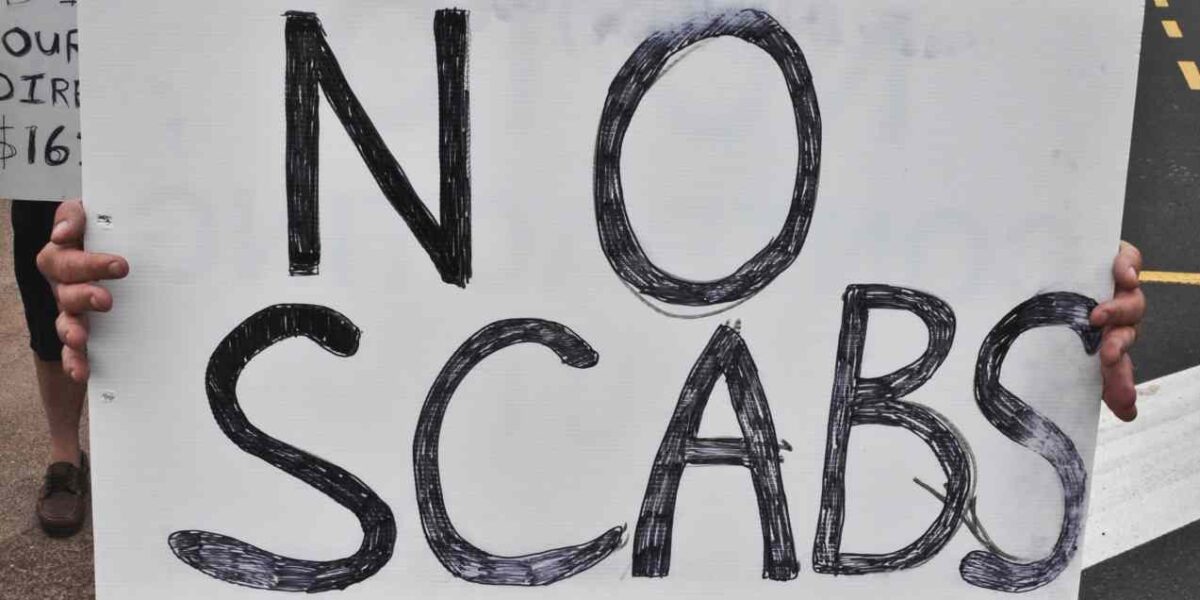It was the great labour singer Woody Guthrie, I think, who once said, “Don’t worry about the scab. If he can’t steal your job, he’ll get by on what he steals from a blind man ‘s cup.” Whether it was Woody or some other worker who coined this pungent line, it captures perfectly the contempt most workers feel for scabs, workers who betray other workers by crossing picket lines to take the jobs of strikers.
Although some will argue that scabs are victims of the business class along with striking workers, lured into crossing lines by economic pressure and false consciousness, and there is some truth to that argument, no one who has ever walked a picket line will soon forget the sinking feeling you get when someone ignores your picket sign and crosses over to steal your work.
The NDP government BC has recently introduced a Bill 9, the Miscellaneous Statutes Amendment Act, 2024; the bill includes an amendment to the province’s labour code designed to close a loophole created in 2022 when a labour board hearing ruled that workers belonging to BC regulated unions could not legally honor a picket line put up by a union regulated federally or in another province. The BC regulated workers were essentially forced, under this ruling, to scab or face legal penalties. In one obnoxious instance, reported in The Tyee by Zak Vescera, the new ruling forced a woman worker, Colleen Lopez-Anhofer, to cross the picket line at her job site and in effect scab against her husband and his locked out fellow workers, who belonged to a federally regulated union.
The assistant business agent for Lopez-Anhofer’s union, IBEW local 213, Robin Nedilla, told The Tyee: “As a union rep, this decision just seems to be a whole number of flavours of wrong.” He argued it put union members in an impossible quandary, pitting them against their colleagues and — in this case — their spouses.
“It kind of sunk in with me that, wait a minute, this is going to divide households here,” Nedila said.
The language in Bill 9, a housecleaning bill introducing amendments to several laws, addresses this unfortunate “scab at gunpoint” loophole. It reads, in part, “ Amendments to the Labour Relations Code will update the definition of ‘strike’ in the Labour Relations Code. The change ensures that when employees under federal jurisdiction or that of another province are on strike, locked out, and establish a picket line in B.C., provincially regulated workers can choose to respect the picket lines without it being considered illegal strike action. Honouring the picket lines of other workers is a fundamental feature of B.C. labour relations and the change adheres to the core principles of labour solidarity. “
This new clarity on the law will make sense to most rabble.ca readers, and most will be pleased to hear that Sussanne Skidmore, president of the BC Federation of Labour told The Tyee’s Brishti Basu when Bill 9 was introduced that the Fed had been talking to the labour ministry for some time about this issue. She told Basu that the issue of forced picket line crossing had been an issue in several recent strikes, saying “Basically any worksite where you potentially have provincially and federally regulated workers, that could be an issue.”
Unsurprisingly, the organized voices of the business class took a different view, a view that was echoed by influential Vancouver Sun columnist Vaughn Palmer. A stern letter from the Greater Vancouver Board of Trade, the BC Chamber of Commerce, the Canadian Federation of Independent Businesses and the Business Council of BC attacked Bill 9, arguing it should be dropped until a previously scheduled review of BC labour law had been completed.
The business groups argued that the labour code changes were far too consequential to be included in catch up legislation like Bill 9 and that the government had not provided enough opportunity for business to consult on the proposed changes. In part, the letter read: “It is unclear what the urgency or public policy purpose is for the proposed legislative change in Bill 9. To our knowledge, the change proposed to the definition of ‘strike’ has no equivalent in legislation governing labour relations in any other province. While proposed and packaged as a minor change, it is not. The change is far-reaching, and we are concerned that it could have significant economic and financial implications. We are concerned that the change will lead to more labour strife, impacting more of our economic base.”
For clarity, when business groups like the signatories to this letter clutch their pearls about damage to “the economy” they mean reduced profits or other bottom line commercial concerns. Apparently in their view, workers are not part of “the economy.”
Vancouver Sun columnist Vaughn Palmer voiced a similar view in his March 14 column, sneering “ The New Democrats are rewriting the Labour Code to reverse a decision by the independent labour board and doing so in the midst of a supposedly independent review of the Code itself. There are many words to characterize such conduct. But fair, balanced and trustworthy aren’t among them.” (Full disclosure: I frequently publish book reviews and very occasionally investigative journalism in the Sun, Palmer’s journalistic home base.)
The proposed amendments to the BC labour code deserve our support. They do not need to wait for the completion of the larger review currently under way, and they do not, despite the heavy breathing by business class spokespeople, represent any great danger to the economy writ large. They may give workers on strike a bit more leverage, and lead to successfully completed strikes. And that is to be celebrated. Workers are the base of the economy. When we do well, the larger economy does well. The cards are stacked against workers under advanced capitalism, and the fairly minor reform represented by Bill 9 does not threaten that larger system in any major way. More’s the pity.



